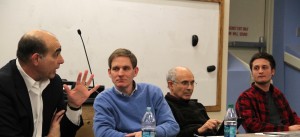Last spring, senior Travis Amengual studied abroad at the Rothberg International School at the Hebrew University of Jerusalem in Israel. When he returned to UR, he acted upon the inspiration he found there and created the Homeland Dialogue Initiative (HDI).
“Being in Israel made me want to change something, or talk about it, at least,” Amengual said. “Initially, I wanted to bring JStreetU, a more liberal Jewish advocacy group to campus, but the Students’ Association thought that that would spark the creation of too many other similar groups.”
Travis didn’t let that dissuade him from his goal of cultivating an environment that would promote discussion about the Israeli-Palestinian conflict. After his plan for JStreetU fell short, Amengual talked to his friend Aaron Marans. Together, they came up with the idea for HDI.
HDI is bipartisan and less political than JStreet, which is a controversial group among the Jewish community.
“There is no group on campus that discusses the Israeli-Palestinian conflict in a constructive way, so we wanted to create a platform for that,” Amengual said.
HDI recently held their first event on Tuesday, Feb. 26, titled “Prospects for Peace: Shaping a New Political Discourse in the Wake of Recent American and Israeli Elections.” The panel discussion featured many notable Jewish community members from Rochester including Larry Fine, executive director of the Jewish Federation of Rochester, Yonathan Shapir, president of the JStreet Rochester Chapter, and Randall Stone, director of the Peter D. Watson Center for Conflict and Cooperation at UR.
Is there ever going to exists separate Israel and Palestine entities? The question on everyone’s mind came up during the last few minutes of the Q&A. The conversation changed to one of occupation, the indivisibility of the land in contest, the complications of the conflict, and U.S. relations with the two nations.
This conversation mirrors similar dialogues across the country. Though HDI is not affiliated with other like groups in America, new organizations are popping up elsewhere with a similar mission. In 2012, students at Brandeis University started Brandeis Visions for Israel in an Evolving World (BVIEW), a club hoping to foster “conversations that emphasize innovation, embrace diversity, empower students, and push us to look toward the future.”
The difference between this group and HDI is the intended audience. BVIEW is aimed at a primarily Jewish audience while the HDI encourages people of all backgrounds to be part of the Israeli-Palestinian conflict conversation.
According to Amengual, the HDI’s next program is an Israeli-Palestinian Poetry Slam, which would ideally take place by the end of this semester. The event will encourage added people to bring poems about peace that offer a different perspective.
The group has also talked about holding a discussion about religious life in West Bank. For now, HDI remains on provisional status, but Amengual still has high hopes for involving the UR community.
“The best way to accomplish the goal of talking is to work together,” Amengual said.
Arre is a member of
the class of 2015.
